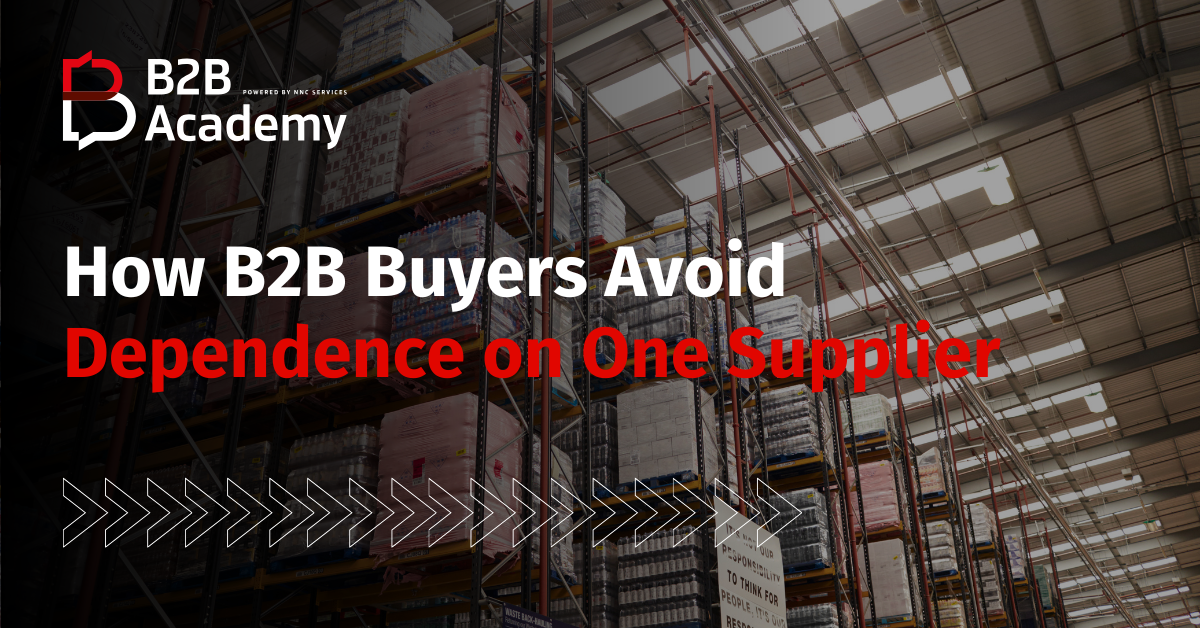Nobody enjoys the feeling of being stuck. Think about everyday situations: a phone plan that keeps you locked into a package you no longer need, a streaming service that continues charging your card long after you’ve stopped watching, or that gym membership that silently renews even though your sneakers haven’t left the closet in months. Each of these examples has the same theme: you lose flexibility, and suddenly a choice you once made starts to feel like a burden.
B2B buyers face a very similar fear when selecting a supplier. It’s not just about the product’s features or the price tag on the proposal. It’s about what happens after they sign. Will this relationship limit their ability to adapt in the future? Will they be tied to one partner, with no realistic way out if circumstances change? That lingering concern can be strong enough to slow down or even stop a deal before it begins.
The unspoken question often running through their minds is: “What if this decision leaves us with no way to change course later?” And until that question is answered with clarity, trust is hard to build.
Why Buyers Worry About Dependence
Think about the last time you had to commit to a big purchase. Didn’t you weigh not just the benefits but also the risks? B2B buyers do the same thing. Their concerns usually sound like this:
- “What happens if this supplier raises prices later?”
- “Will switching cost us more than staying?”
- “What if their system doesn’t fit with our future plans?”
- “Do we lose bargaining power by depending on them too much?”
The worry isn’t always about today,it’s about tomorrow. And your role is to show them you’ve already thought about those questions.
The Hidden Costs of Dependence
When buyers talk about avoiding dependence, they’re really thinking about risks that can grow over time:
- High switching costs: It can be expensive and time-consuming to replace a supplier.
- Operational disruption: Moving to another vendor might mean downtime or retraining staff.
- Lost leverage: When buyers feel locked in, they fear they’ll have less say in negotiations.
- Innovation gap: A supplier that doesn’t adapt could drag the buyer down with them.
In short, dependence feels like putting all the eggs in one basket, and then worrying the basket has a weak handle.
What Buyers Want Instead
Here’s the good news: buyers don’t expect perfection. What they want is flexibility and reassurance. They want to know that working with you now won’t limit their choices later.
- Transparency: Clear terms, clear pricing, and no hidden surprises.
- Flexibility: Options to scale services up or down without major penalties.
- Exit paths: Confidence that if they need to move on, the process won’t be a nightmare.
- Collaboration: A sense that you’ll adapt with them as their needs evolve.
Ask yourself: Do I make my clients feel free, even while they’re choosing me?
 How You Can Reassure Buyers
How You Can Reassure Buyers
You don’t need grand promises; what works is practical reassurance. Here are ways to build confidence:
- Offer shorter contracts
- Instead of locking buyers into multi-year deals immediately, offer them the option of shorter terms. This shows confidence in your ability to earn renewal.
- Provide clear exit clauses
- Put it in writing: how can a client leave if they need to? Ironically, the clearer the exit, the more likely they are to stay.
- Support interoperability
- If your solution can integrate with others, highlight that. Buyers want to know they won’t have to scrap everything if they grow.
- Show real-world examples
- Share stories where you adapted for a client or worked alongside another supplier. Proof beats promises.
- Encourage co-planning
- Ask buyers about their long-term goals and explain how your solution can evolve with them.
A Light Touch: Why This Matters More Than You Think
Here’s a simple way to think about it: committing to one supplier without flexibility is like going to a restaurant where the only option is the “chef’s surprise.” Maybe it’ll be great… but maybe not.
When buyers feel they have no menu, they worry. Your job is to show them the options, the specials, and yes, even the exit. That’s how you turn fear into trust.
Building a Reputation for Flexibility
This isn’t just about one deal. Over time, your reputation depends on how you handle dependence concerns across all clients. Here are steps you can take:
- Document your adaptability: Keep track of cases where you’ve adjusted to client needs.
- Communicate changes openly: Whether it’s pricing or service updates, no one likes surprises.
- Offer references: Let prospects talk to clients who’ve been with you for years. Nothing reassures like hearing, “We’ve never felt trapped.”
- Promote partnership, not control: Show that you see the relationship as ongoing collaboration, not a lock-and-key contract.
Questions You Can Ask to Build Trust
Instead of waiting for buyers to raise their fears, address them head-on. Try questions like:
- “What would make you feel more comfortable about a long-term commitment?”
- “Do you want flexibility built into this agreement?”
- “How important is integration with your existing systems?”
- “Would it help to have a clear exit clause from the start?”
These questions don’t just calm worries; they show that you understand their perspective.
Dependence on one supplier feels risky to buyers because it limits their future choices. If you ignore that fear, you may lose the deal without ever knowing why.
But if you acknowledge it and show practical ways you offer flexibility, you stand out as a partner, not a trap.
So the next time you’re working with a prospect, ask yourself:
- Am I giving them flexibility, or just a long contract?
- Do they know they’ll have options later?
- Would I feel comfortable committing if I were in their position?
Because when buyers feel free to choose, they often choose to stay.




